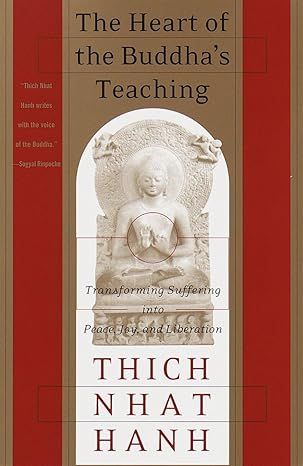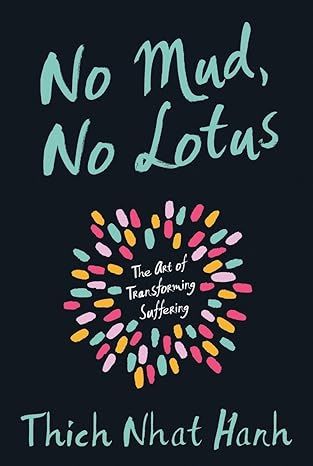The Heart of the Buddha's Teaching: Transforming Suffering into Peace, Joy, and Liberation
4.8
-
7,121 ratings
With poetry and clarity, Thich Nhat Hanh imparts comforting wisdom about the nature of suffering and its role in creating compassion, love, and joy – all qualities of enlightenment.
“Thich Nhat Hanh shows us the connection between personal, inner peace, and peace on earth.”—His Holiness the Dalai Lama
In The Heart of the Buddha’s Teaching, now revised with added material and new insights, Nhat Hanh introduces us to the core teachings of Buddhism and shows us that the Buddha’s teachings are accessible and applicable to our daily lives.
Covering such significant teachings as the Four Noble Truths, the Noble Eightfold Path, the Three Doors of Liberation, the Three Dharma Seals, and the Seven Factors of Awakening, The Heart of the Buddha’s Teaching is a radiant beacon on Buddhist thought for the initiated and uninitiated alike.
Kindle
$13.99
Available instantly
Audiobook
$0.00
with membership trial
Hardcover
$24.71
Paperback
$13.29
Ships from
Amazon.com
Payment
Secure transaction
ISBN-10
0767903692
ISBN-13
978-0767903691
Print length
304 pages
Language
English
Publisher
Harmony
Publication date
June 07, 1999
Dimensions
5.15 x 0.78 x 7.97 inches
Item weight
8.4 ounces
Popular Highlights in this book
Mindfulness is the energy that allows us to recognize our habit energy and prevent it from dominating us.
Highlighted by 4,402 Kindle readers
The Fourth Noble Truth is the path (marga) that leads to refraining from doing the things that cause us to suffer.
Highlighted by 4,195 Kindle readers
Without suffering, you cannot grow. Without suffering, you cannot get the peace and joy you deserve.
Highlighted by 3,716 Kindle readers
Product details
ASIN :
B011G3HD6I
File size :
2945 KB
Text-to-speech :
Enabled
Screen reader :
Supported
Enhanced typesetting :
Enabled
X-Ray :
Enabled
Word wise :
Enabled
Editorial Reviews
“Thich Nhat Hanh writes with the voice of the Buddha.”—Sogyal Rinpoche
“If there is a candidate for 'Living Buddha' on earth today, it is Thich Nhat Hanh.”—Richard Baker-roshi
“Thich Nhat Hanh shows us the connection between personal, inner peace, and peace on earth.”—His Holiness the Dalai Lama
“Thich Nhat Hanh is a real poet.”—Robert Lowell
Sample
The First Dharma Talk
Siddhartha Gautama was twenty-nine years old when he left his family to search for a way to end his and others' suffering. He studied meditation with many teachers, and after six years of practice, he sat under the bodhi tree and vowed not to stand up until he was enlightened. He sat all night, and as the morning star arose, he had a profound breakthrough and became a Buddha, filled with understanding and love. The Buddha spent the next forty-nine days enjoying the peace of his realization. After that he walked slowly to the Deer Park in Sarnath to share his understanding with the five ascetics with whom he had practiced earlier.
When the five men saw him coming, they felt uneasy. Siddhartha had abandoned them, they thought. But he looked so radiant that they could not resist welcoming him. They washed his feet and offered him water to drink. The Buddha said, "Dear friends, I have seen deeply that nothing can be by itself alone, that everything has to inter-be with everything else. I have seen that all beings are endowed with the nature of awakening." He offered to say more, but the monks didn't know whether to believe him or not. So the Buddha asked, "Have I ever lied to you?" They knew that he hadn't, and they agreed to receive his teachings.
The Buddha then taught the Four Noble Truths of the existence of suffering, the making of suffering, the possibility of restoring well-being, and the Noble Eightfold Path that leads to well-being. Hearing this, an immaculate vision of the Four Noble Truths arose in Kondañña, one of the five ascetics. The Buddha observed this and exclaimed, "Kondañña understands! Kondañña understands!" and from that day on, Kondañña was called "The One Who Understands."
The Buddha then declared, "Dear friends, with humans, gods, brahmans, monastics, and maras as witnesses, I tell you that if I have not experienced directly all that I have told you, I would not proclaim that I am an enlightened person, free from suffering. Because I myself have identified suffering, understood suffering, identified the causes of suffering, removed the causes of suffering, confirmed the existence of well-being, obtained well-being, identified the path to well-being, gone to the end of the path, and realized total liberation, I now proclaim to you that I am a free person." At that moment the Earth shook, and the voices of the gods, humans, and other living beings throughout the cosmos said that on the planet Earth, an enlightened person had been born and had put into motion the wheel of the Dharma, the Way of Understanding and Love. This teaching is recorded in the Discourse on Turning the Wheel of the Dharma (Dhamma Cakka Pavattana Sutta).2 Since then, two thousand, six hundred years have passed, and the wheel of the Dharma continues to turn. It is up to us, the present generation, to keep the wheel turning for the happiness of the many.
Three points characterize this sutra. The first is the teaching of the Middle Way. The Buddha wanted his five friends to be free from the idea that austerity is the only correct practice. He had learned firsthand that if you destroy your health, you have no energy left to realize the path. The other extreme to be avoided, he said, is indulgence in sense pleasures--being possessed by sexual desire, running after fame, eating immoderately, sleeping too much, or chasing after possessions.
The second point is the teaching of the Four Noble Truths. This teaching was of great value during the lifetime of the Buddha, is of great value in our own time, and will be of great value for millennia to come. The third point is engagement in the world. The teachings of the Buddha were not to escape from life, but to help us relate to ourselves and the world as thoroughly as possible. The Noble Eightfold Path includes Right Speech and Right Livelihood. These teachings are for people in the world who have to communicate with each other and earn a living.
The Discourse on Turning the Wheel of the Dharma is filled with joy and hope. It teaches us to recognize suffering as suffering and to transform our suffering into mindfulness, compassion, peace, and liberation.
Read more
About the authors
Thich Nhat Hanh
Thich Nhat Hanh (1926–2022) was a Vietnamese Buddhist Zen Master, poet, and peace activist and one of the most revered and influential spiritual teachers in the world. Born in 1926, he became a Zen Buddhist monk at the age of sixteen. His work for peace and reconciliation during the war in Vietnam moved Dr. Martin Luther King Jr. to nominate him for the Nobel Peace Prize in 1967. In Vietnam, Thich Nhat Hanh founded Van Hanh Buddhist University and the School of Youth for Social Service, a corps of Buddhist peace workers. Exiled as a result of his work for peace, he continued his humanitarian efforts, rescuing boat people and helping to resettle refugees. In 1982 he established Plum Village France, the largest Buddhist monastery in Europe and the hub of the international Plum Village Community of Engaged Buddhism. Over seven decades of teaching, he published a hundred books, which have been translated into more than forty languages and have sold millions of copies worldwide.
Read more
Reviews
Customer reviews
4.8 out of 5
7,121 global ratings
Susan
5
A Transformative Guide to Peace, Joy, and Liberation!
Reviewed in the United States on March 31, 2024
Verified Purchase
Review:
'The Heart of the Buddha's Teaching' is a profound and accessible exploration of the core principles of Buddhism, offering a practical roadmap for transforming suffering into peace, joy, and liberation.
Clear and Comprehensive:
The book is written in a clear and engaging style, making it accessible to readers of all backgrounds. Thich Nhat Hanh, the renowned Zen master and peace activist, presents the teachings of the Buddha with clarity and depth, providing a comprehensive understanding of the Four Noble Truths, the Eightfold Path, and other fundamental concepts.
Practical Applications:
Beyond theoretical explanations, the book emphasizes the practical application of Buddhist teachings in daily life. Thich Nhat Hanh shares mindfulness practices, meditations, and exercises that help readers cultivate awareness, compassion, and wisdom. These practices are designed to transform suffering and promote inner peace and happiness.
Transformative Insights:
The book offers profound insights into the nature of suffering and the path to liberation. Thich Nhat Hanh challenges common misconceptions about Buddhism, such as the idea that it is a pessimistic or nihilistic philosophy. Instead, he presents Buddhism as a transformative path that empowers individuals to overcome suffering and create a more fulfilling life.
Compassion and Inclusivity:
Throughout the book, Thich Nhat Hanh emphasizes the importance of compassion and inclusivity. He teaches that all beings are interconnected and that our happiness is inextricably linked to the well-being of others. The book encourages readers to cultivate a compassionate heart and to work towards creating a more just and harmonious world.
Conclusion:
'The Heart of the Buddha's Teaching' is an invaluable resource for anyone seeking to deepen their understanding of Buddhism and to apply its principles in their own lives. Thich Nhat Hanh's wisdom, compassion, and practical guidance make this book a transformative guide that can lead to profound peace, joy, and liberation. Highly recommended for spiritual seekers, practitioners of all faiths, and anyone interested in living a more meaningful and fulfilling life.
Read more
5 people found this helpful
Excellent
5
Perspective
Reviewed in the United States on June 25, 2024
Verified Purchase
I liked everything
Steve Weibel
5
Buddhism easily understood, elegantly written book
Reviewed in the United States on November 19, 2010
Verified Purchase
Of all the books I've read regarding Buddhism this by far is the best place to start. Thich Nhat Hanh is an accomplished writer with a unique ability to make what many appear to be complex subject matter easily understood, friendly, and approachable. Reading the first 50 pages or so brings the reader into a rich, non-threatening understanding of this wonderful way of thinking. Buddhism is non-sectarian, non-judgmental and simply elegant in it's basic premise...that life is about suffering and that if we deploy our own minds to fixing the problem, that we in fact can do just that. Unlike so many "religions", which Buddhism is NOT, it teaches us a kind and gentle way to operate in life. From the four Noble Truths to mindfulness, it shows a pathway to living a happy life, however you define that. The hard charging salesman, the gentle mother, the introspective person, the troubled couple, the recovering addict.....for all of these suffering is the same. And for anyone intent on changing their lives, to come face to face with the big problems of their lives, this book reminds the reader that the solution is simpler than you might think. Buddhism evokes images of monks on fire in Vietnam, people wearing robes and sitting on a mountain top and all things in between. It's mystical in some ways, it's aura keeping many people away. But on first reading of this book it will speak directly to you. Remember back to when your grandparent, parent or good friend sat down and gave you great advice, that advice that made the tears stop and the resolve to set in, when you saw that your issue was fixable. This book is like that. The reminder of how simple honorable behavior, honesty, integrity and kindness can change you and change the world. Heavily dependent on your personal behavior and actions, it teaches you a path, Whether you take it or not is purely up to you. The most ardent skeptic about Buddhism will be moved by this book. If you think Buddhism is a lot of bunk and that you can solve the problems of live on your own, think again. The path of happiness comes from all edges of the forest. This book will lead you to a clearing in your life. For a thinking person, a person with an open heart and an open mind, this book is truly tranformative. Read it aloud to yourself and to others. Everyone will benefit. Steve Weibel
Read more
74 people found this helpful
A.D
5
Buddhism in one book
Reviewed in the United States on June 21, 2024
Verified Purchase
Very easy to read and understand. The concepts of Buddhism has been explained deliberately and delicately.
Bob
5
One of the best books I've read on Buddha's Teachings
Reviewed in the United States on April 23, 2024
Verified Purchase
I've read a number of books on Buddhist practices and teachings and I feel that Thich Nhat Hahn's The Heart of the Buddha's Teaching is one of the best by making these teaching applicable to our daily and personal lives. I've been doing a meditation practice for several decades and find that the resulting inner peace is so helpful in my personal and working relationships. Thich Nhat Hanh writes in a way that clearly shows how these teachings can transform one's life.
Read more
4 people found this helpful
Top Thich Nhat Hanh titles
Best Sellers

The Great Alone: A Novel
4.6
-
152,447
$5.49

The Four Winds
4.6
-
156,242
$9.99

Winter Garden
4.6
-
72,838
$7.37

The Nightingale: A Novel
4.7
-
309,637
$8.61

Steve Jobs
4.7
-
24,596
$1.78

Iron Flame (The Empyrean, 2)
4.6
-
164,732
$14.99

A Court of Thorns and Roses Paperback Box Set (5 books) (A Court of Thorns and Roses, 9)
4.8
-
26,559
$37.99

Pretty Girls: A Novel
4.3
-
88,539
$3.67

The Bad Weather Friend
4.1
-
34,750
$12.78

Pucking Around: A Why Choose Hockey Romance (Jacksonville Rays Hockey)
4.3
-
41,599
$14.84

Start with Why: How Great Leaders Inspire Everyone to Take Action
4.6
-
37,152
$9.99

Tomorrow, and Tomorrow, and Tomorrow: A novel
4.4
-
95,875
$13.99

Weyward: A Novel
4.4
-
27,652
$11.99

Tom Lake: A Reese's Book Club Pick
4.3
-
37,302
$15.74

All the Sinners Bleed: A Novel
4.4
-
12,894
$13.55

The Mystery Guest: A Maid Novel (Molly the Maid)
4.3
-
9,844
$14.99

Bright Young Women: A Novel
4.2
-
8,485
$14.99

The Wager: A Tale of Shipwreck, Mutiny and Murder (Random House Large Print)
4.5
-
28,672
$14.99

Hello Beautiful (Oprah's Book Club): A Novel (Random House Large Print)
4.4
-
79,390
$14.99

Small Mercies: A Detective Mystery
4.5
-
16,923
$10.00

Holly
4.5
-
31,521
$14.99

The Covenant of Water (Oprah's Book Club)
4.6
-
69,712
$9.24

Wellness: A novel
4.1
-
3,708
$14.99

The Art Thief: A True Story of Love, Crime, and a Dangerous Obsession
4.3
-
4,805
$14.99


